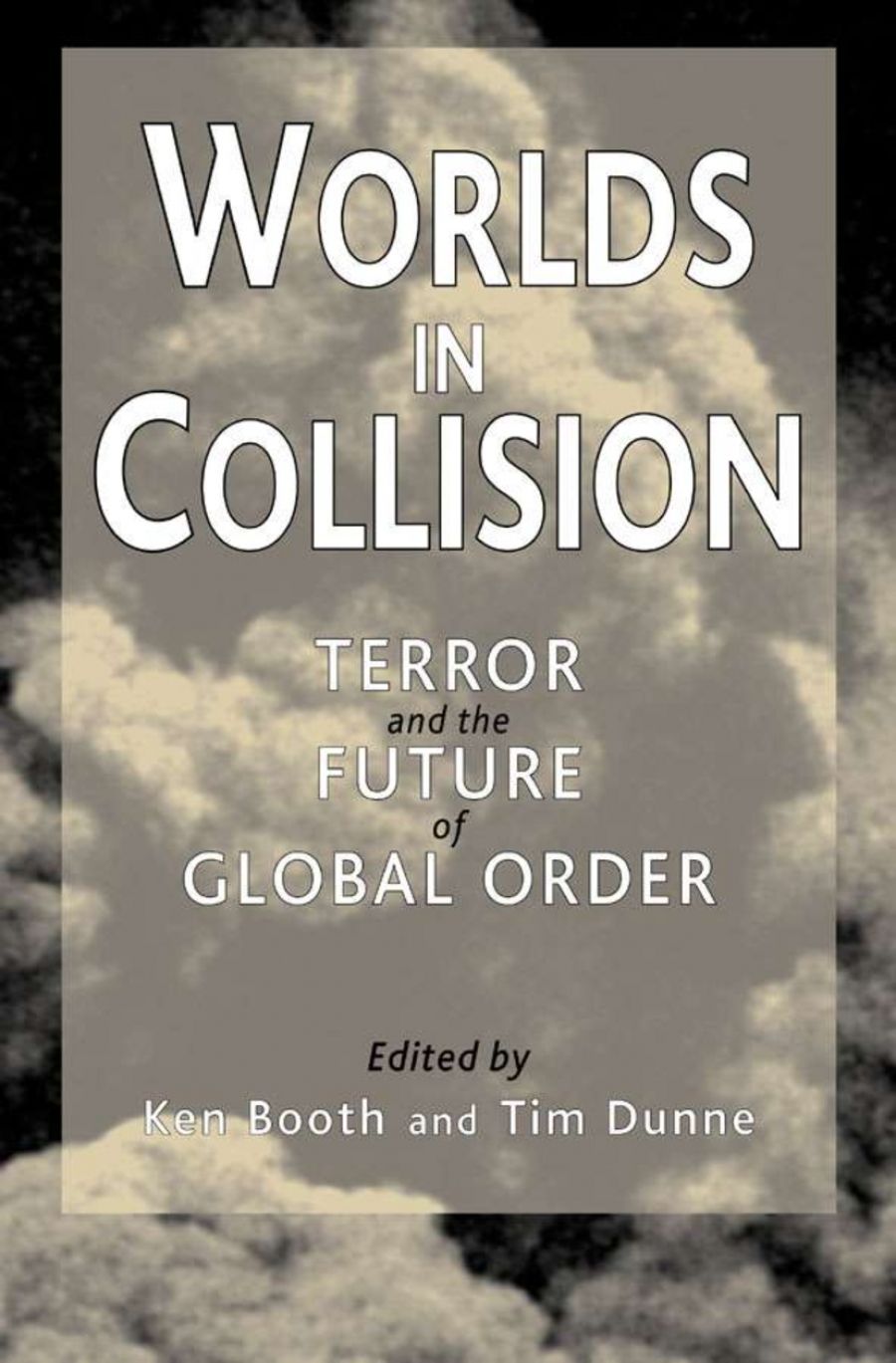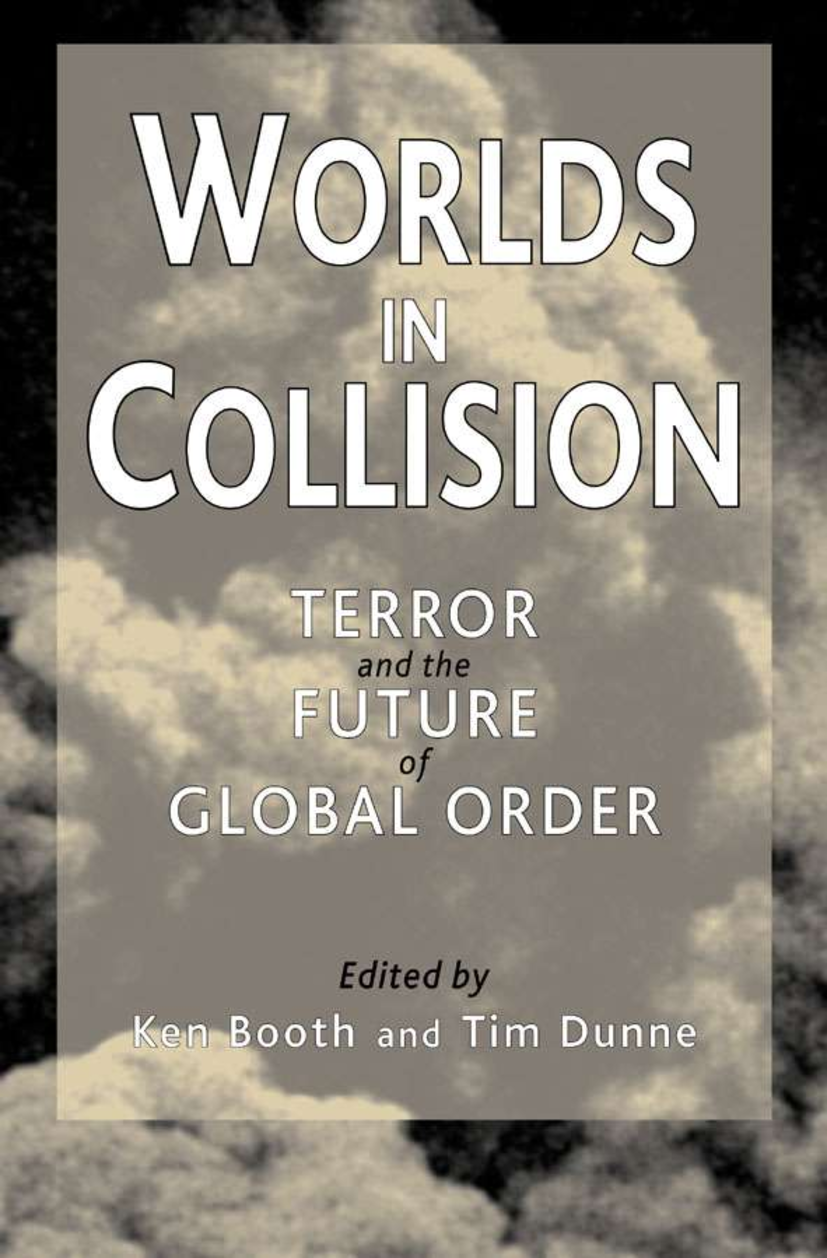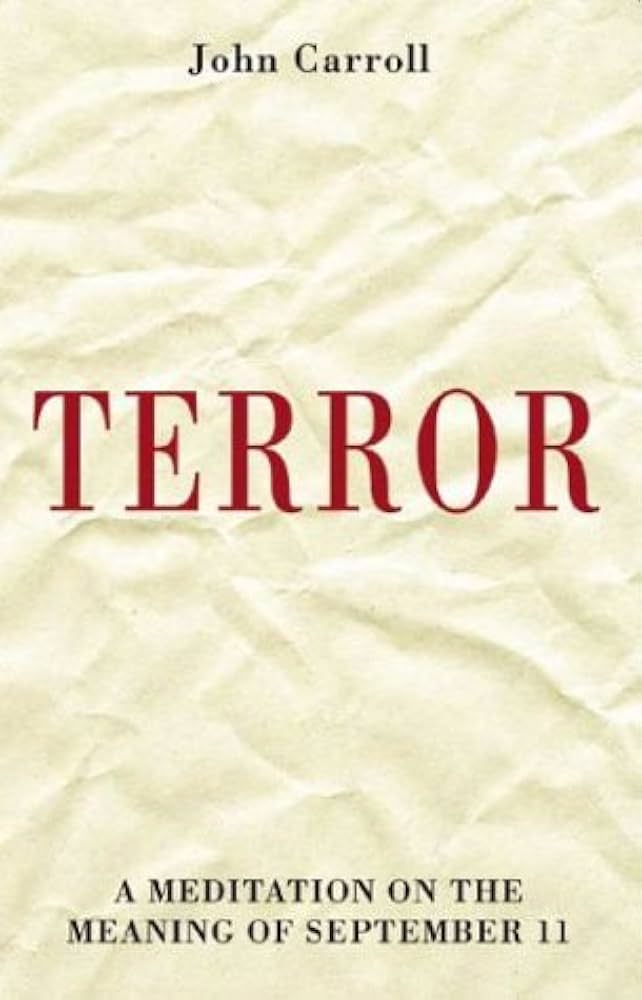
- Free Article: No
- Contents Category: Military History
- Review Article: Yes
- Article Title: Ikea Towers
- Online Only: No
- Custom Highlight Text:
These two books represent strikingly different responses to the events of September 11; indeed in some respects they encompass radically divergent human reactions to tragedy of any sort. The Worlds in Collision collection is mostly cool, analytic and carefully reasoned; it contains a pooling of ideas from many different sources, an academic symposium in print. John Carroll’s book is highly personal, rhetorical and passionately grim. He calls it ‘a meditation’, but the tone is not one of quiet reflection, but of prophetic jeremiad. Ken Booth and Tim Dunne want to help us cope with an urgent political problem; Carroll wants to indict a spiritual disease and issue a call for cultural reform. The stock-in-trade of most of the contributors to Worlds in Collision is argument; for Carroll it is primarily metaphor.
- Book 1 Title: Worlds in Collision
- Book 1 Subtitle: Terror and the future of global order
- Book 1 Biblio: Palgrave Macmillan, $49.95pb, 376 pp
- Book 1 Cover Small (400 x 600):

- Book 1 Cover (800 x 1200):

- Book 2 Title: Terror
- Book 2 Subtitle: A meditation on the meaning of September 11
- Book 2 Biblio: Scribe, $16.95pb, 106 pp
- Book 2 Cover Small (400 x 600):

- Book 2 Cover (800 x 1200):

My own sympathies are predominantly with the Worlds in Collision approach, but Carroll’s fulminations against secular humanism and the cosy materialism of ‘the West’ have their place as reminders that, sometimes, matters of broad outlook or worldview lurk in the background of problematic events and can go undetected by cool analysis. Nonetheless, while he offers some shrewd observations along the way, I found his account of such matters unpersuasive.
Worlds in Collision is a collection of thirty-one mostly short pieces by prominent political commentators and intellectuals. There are good pieces by Kenneth Waltz, Desmond Ball, Richard Falk, Bhikhu Parekh and Steve Smith, among others. It is impossible to discuss all the articles, but several call out for comment. ‘Who are the Global Terrorists?’ gives us Noam Chomsky at his best. He exposes the hypocrisy that frequently besets powerful nations in dealing with setbacks to their own interests – plenty of that in reactions to the horrors of September 11. The idea that the terrorist attacks prove that ‘they’ are evil and ‘we’ are good ignores all the evil that ‘we’ have inflicted on the world, as well as the evil ‘we’ have connived at or culpably ignored. Chomsky takes the CIA’s broad definition of terrorism and has no difficulty convicting the USA of being perpetrators and sponsors of such terrorism around the globe. Even a narrower definition that sees terrorism as a particular sort of tactic in the violent pursuit of political ends, namely the tactic of attacking the innocent or non-combatants, would yield plenty of examples of powerful states, including the USA, sponsoring or perpetrating terrorism. This does not, of course, excuse the planners and perpetrators of the September 11 attacks, but it spreads the guilt more widely and offers a saner perspective on our difficulties than the Manichean dichotomies that drive so much American foreign policy at the moment.
Several of the essays probe the broader objectives of the US military response to terrorism. Immanuel Wallerstein points out that the Bush administration has a more troubling agenda than dealing with Al Qaeda. The rhetoric of régime change encompasses the violent reconstitution of all those ‘rogue states’ (or more recently ‘states of concern’) that have annoyed or defied Washington for many years. Iraq, Iran and North Korea are to the forefront, but who knows which country will next attract the attention of the imperial ‘reformers’. Wallerstein does not draw this conclusion, but it begins to look as if the younger Bush and his associates are bent upon giving new life to his father’s failed dreams of ‘a new world order’. The effort to achieve this aim by military means is fraught with dangers. The US government may think that they are mighty enough to act alone (with token assistance from minnows like Australia and bigger fish like the UK) but there is no stomach in the USA for another Vietnam or Korea. In any case, such a campaign has little relevance to the ‘war against terrorism’, since the awful rulers of Iraq and North Korea are not religious fundamentalists driven to crush unbelievers, and the complex evolution of Iran towards a modern democracy looks a far better option than régime change through the invasion of imperial warriors.
As for the war on terrorism, Wallerstein rightly points out that the idea of eradicating terrorism by war has slim prospects of success. It hasn’t worked against the IRA, the Basque separatists, Hamas or Hezbollah, the Chechen rebels or the Colombian FARC. In the end, concession on political issues, negotiation, policing and compromise must play significant roles.
Barry Bazun’s interesting chapter, ‘Who May We Bomb?’, seeks to challenge the conventional moral and legal wisdom that we may not target civilians. He argues that the crucial question is whether people ‘deserve their governments’, with the implication that, if they do and their governments are worthy of attack, so are they. There are important issues of moral and legal responsibility in Bazun’s discussion, but they are mostly obscured by his way of framing them. The question is not whether people deserve their governments (whatever that means) but whether they are combatants, in the sense that they are involved in the chain of agency prosecuting the evil that a legitimate war is aiming to prevent. The equation of non-combatants with civilians is useful shorthand, but certainly some civilians (such as scientists manufacturing biological weapons during war) may be combatants. In the context of war, speculation about complex matters of responsibility beyond direct agency is far too dangerous a way to target policy.
John Carroll is a proponent of the big metaphysical picture, and his has a quasi-religious shape. He believes that the horrors of September 11 pose a challenge to the will and identity of the West. The religious passion of the fanatical killers of September 11 challenges the West, mired in materialist consumerism, to find self-knowledge and spiritual meaning. Using themes from Conrad’s Heart of Darkness, and various other cultural products, Carroll expresses a sense of loathing for the contemporary world and asks us to retrace our steps so that we can find our true selves. He thinks the events of September 11 demand that the West and its leaders face the challenge posed by the gunman in John Ford’s The Man Who Shot Liberty Valance: ‘What kind of man are you, Dude?’
In the present crisis, this is not an encouraging prompt. The Texan in the White House is all too keen to strut his stuff, and has no need of cultural critics to bolster his international virility. But Carroll admires power. Of the Afghanistan campaign, he says: ‘The streets of the Muslim world fell silent. As usual throughout history, the successful deployment of power had proven persuasive.’ Yet we know that the massively successful bombardment and defoliation of the Vietnam War was ultimately far from persuasive, just as the Israeli devastation of Palestine is all too likely to delay a solution to that difficult regional problem.
Carroll links the hole in the earth at ‘ground zero’ to the hole in the earth from which Lazarus was raised from the dead by Christ. If this is not startling enough, he then provides a strange exegesis of the Gospel story in which Jesus is supposed to have told Martha enigmatically, ‘I am’. This leads to various reflections about ‘being’ and the present crisis. But the trouble is Jesus said nothing of the sort. True, he used the words ‘I am’, but followed them with predicates that made a complete sentence: ‘I am the resurrection and the life; he who believes in me, even if he die, shall live; and whoever lives and believes in me shall never die.’ No doubt, the sentence is enigmatic enough, but it encapsulates a theology and is a poor peg for the lofty metaphysics that Carroll invokes.
Carroll does not like Ikea apartments. He thinks the crisis of September 11 has plunged us ‘into a sea of difficulty utterly beyond our conception’, and he mysteriously describes the US war against Afghanistan as ‘Jurassic Park strikes back’. He concludes by recommending the ruthless ‘great warrior’ Achilles as a model for our times: ‘Do what has to be done, and with no holding back.’ Talking of holes, we need this sort of advice like a hole in the head.


Comments powered by CComment